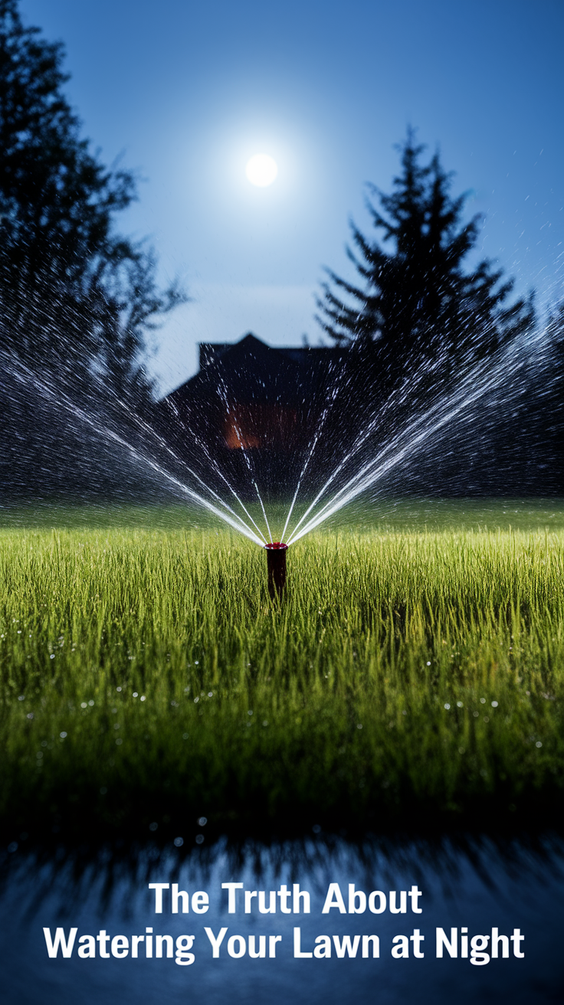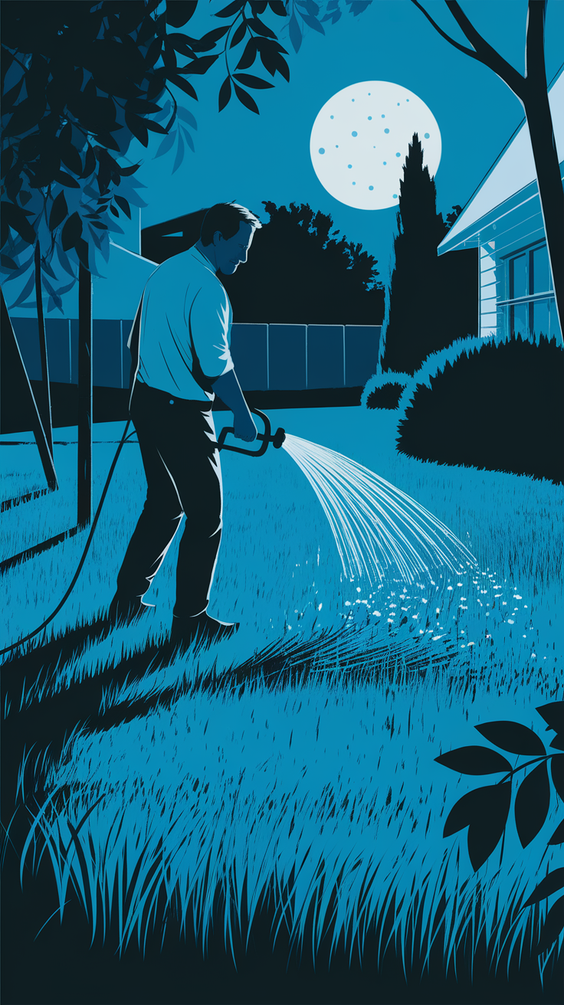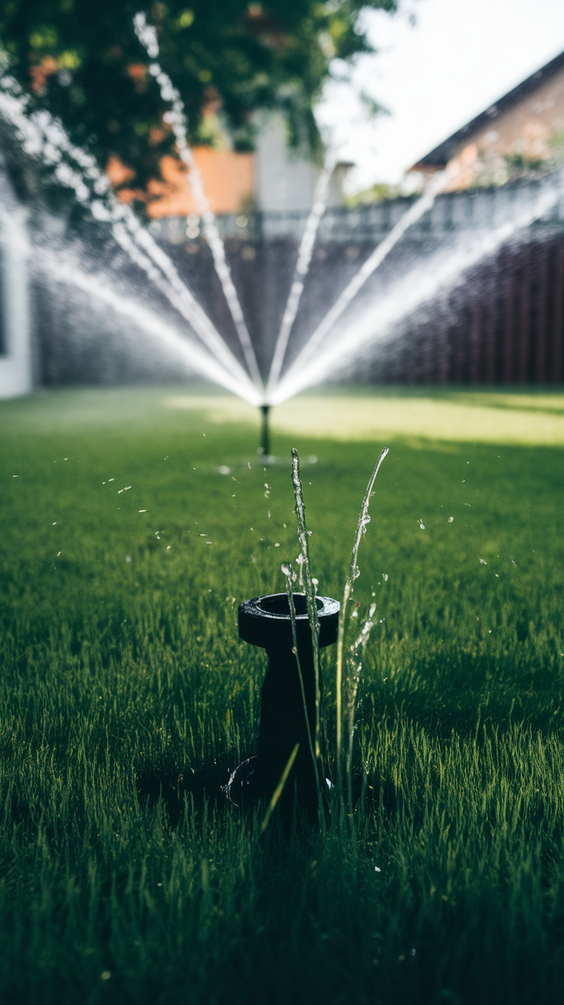The Truth About Watering Your Lawn at Night in 2025: Myths, Risks, and Smart Tips

Did You Know Nighttime Watering Could Harm Your Lawn?
You’ve probably heard that watering your lawn at night is efficient because there’s no sun to evaporate the moisture. The scientific consensus for nighttime lawn watering has shifted in 2025 toward recommending people to stop using their hoses. While the idea might sound smart, it could do more harm than good—especially to your grass.
Many homeowners in the U.S. still stick to after-sunset watering schedules. But newer research and landscaping professionals warn about potential consequences like fungal growth, disease, and poor root development.
In this article, you’ll find out what really happens to your lawn when you water it at night, the latest best practices, and what times actually work best. Whether you’re using a sprinkler system or doing it by hand, this guide will help you avoid common mistakes and keep your lawn green, lush, and healthy.
Who is this for?
Anyone with a yard, from beginner homeowners to lawn care enthusiasts and professionals managing residential landscapes.
Why Do People Water Their Lawns at Night?
It often seems like a practical solution. The nighttime provides cooler conditions without exposing water to the intense sun which causes evaporation. Plus, many municipal water restrictions push watering times to the evening.
But here’s the catch: convenience doesn’t always mean correctness.
If you’ve ever asked yourself, “Is it okay to water the lawn at 9 PM?”—you’re not alone. But as we’ll see below, the nighttime approach has some serious flaws.
What Actually Happens to Grass When Watered at Night?
Dampness Lingers Longer
When you water in the evening or at night, the moisture stays on the blades and in the soil longer because there’s no sunlight to dry it out. This prolonged dampness can be a breeding ground for fungus and disease.
Poor Oxygen Exchange at Root Level
Soaking soil overnight can displace oxygen near the roots, especially in dense or compacted lawns. That can limit healthy root development and lead to shallow growth.
So ask yourself: is a small gain in evaporation efficiency worth risking root health?

What Lawn Experts Say in 2025
According to the American Society of Landscape Architects, the consensus is clear: early morning is still the best time to water.
Modern irrigation systems with built-in soil sensors and timers have made it easier than ever to avoid night watering altogether. Even in water-restricted zones, morning hours (typically 4–10 AM) are recommended.
“Nighttime watering may look like you’re saving water, but you might be growing mold instead,” — Jared Rowley, Certified Turf Specialist, Atlanta, GA.
5 Key Reasons to Avoid Watering at Night
Here’s a quick breakdown of what you risk by sticking with night watering:
Fungal Diseases: Lawn diseases like dollar spot and brown patch thrive in moist, dark environments.
Pest Attraction: Slugs, mosquitoes, and other pests love soggy turf.
Weed Growth: Weeds often thrive when conditions are damp and warm overnight.
Soil Compaction: Waterlogging during cool nights reduces airflow in soil.
Wasted Resources: Inconsistent absorption can still happen if the lawn is oversaturated.
Does this sound like a healthy lawn to you?
So, When Should You Water Your Lawn?
Early Morning = Optimal Time
The best time is between 4 AM and 9 AM. Temperatures are cool, wind is minimal, and grass has all day to absorb and dry naturally.
Automation Helps
Use timers or smart sprinkler systems to set a consistent early schedule. The initial setup might take effort, but it’ll save you time and prevent disease.
Are There Times When Night Watering Is Acceptable?
Rarely—but yes.
Extreme heatwaves: If early morning watering isn’t possible and your grass is drying out dangerously.
Manual-only systems: Some people can only water at night due to work or schedule. In that case, aim for just after sunset (not late night) and use minimal water.
No choice due to water restrictions: If your city mandates watering after 8 PM, focus on brief, controlled watering and increase lawn aeration.
Watering Schedule Comparison Table
| Timing | Disease Risk | Water Efficiency | Root Health | Recommended |
|---|---|---|---|---|
| Early Morning | Low | Moderate | Excellent | ✅ Yes |
| Late Afternoon | Medium | Moderate | Good | ⚠ Sometimes |
| Nighttime | High | Moderate | Poor | ❌ Avoid |
Already Been Watering at Night? Here’s What to Watch For
Check for these warning signs:
Yellow or brown patches that spread quickly
Mushrooms or mold on the soil surface
Soft, spongy patches underfoot
Increased weed or insect activity
What to do:
Start aerating your lawn, scale back watering frequency, and apply fungicide if needed. Then reset your schedule to mornings.
Lawn Care Myths About Night Watering (Busted)
Let’s address a few common beliefs:
“It saves water” — Not true if your lawn develops issues that require re-sodding.
“Everyone does it” — Tradition doesn’t equal best practice.
“I’ve never seen a problem” — Fungal diseases often build slowly and appear during stress.
Be honest—have you believed any of these myths?
Top Lawn Watering Tips for 2025
Install a smart irrigation system with weather sync
Water deeply, 2–3 times a week instead of daily
Adjust schedule monthly based on climate
Invest in moisture sensors for better accuracy
Mow at a higher blade setting to reduce evaporation
💡 Pro Tip: Pair watering with core aeration twice a year to keep soil loose and root-friendly.
Recommended Equipment for Better Lawn Watering
Looking to upgrade? These options are worth a look:
Rachio Smart Sprinkler Controller: Wi-Fi control and seasonal adjustments
Orbit B-hyve: Budget-friendly with app scheduling
Moisture sensors: Save water by watering only when needed
Drip edge systems: Great for flower beds around lawns
Technology makes lawn care easier—don’t be afraid to embrace it.

Real Homeowner Story: What Night Watering Did to My Lawn
In Phoenix, AZ, homeowner Kelly M. used to water at 9 PM every other day. One month into watering at 9 PM every other day her Bermuda grass showed brown spots. A turf specialist confirmed it was fungal damage from high overnight moisture.
Her fix? The homeowner installed a smart controller and set the system to water at 6 AM with additional soil testing procedures. Within two months, her lawn was back to lush green.
Expert Opinions from U.S. Landscapers
“Most problems I treat start with poor watering habits. And nighttime is at the top of that list.”
— Juan Rivera, Lawn Health Specialist, Dallas, TX
“If you can water at sunrise, you’re already ahead of 80% of homeowners.”
— Leah Brown, Sustainable Landscaper, Portland, OR
What Do You Think?
Do you water your lawn at night? Have you noticed any side effects?
Drop a comment and share your experience. Your insight might help someone else avoid the same mistakes.
And if this guide helped you—send it to a neighbor or share it in your local Facebook group!
Conclusion: What You Should Remember
Let’s wrap up with the core takeaways:
Nighttime watering increases disease risk and can do more harm than good.
Early morning watering gives your lawn the best shot at thriving.
Use technology to automate and optimize your watering schedule.
If you must water at night, take steps to limit risks with minimal watering and good lawn maintenance.
Still unsure? Test a few weeks of early-morning watering—your lawn’s health will speak for itself.
